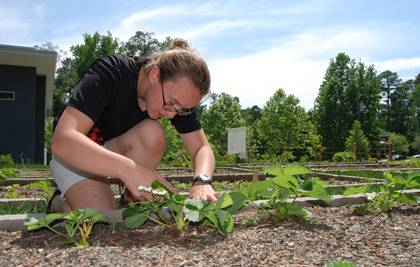Next Step In Duke's Green Revolution
Two campus locations are part of a new, national sustainable program

Duke is finalizing two locations as part of the Sustainable Site Initiative, a program established by the American Society of Landscape Architects, Lady Bird Johnson Wildflower Center and the United States Botanic Garden to establish the first national rating system for sustainable landscapes.
Duke's Sustainable Site locations include a space by the Home Depot Smart Home, now known as "Smart-Sustainable Landscapes" (formally Duke's Community Garden), and the Charlotte Brody Discovery Garden, an educational space being built at the Sarah P. Duke Gardens.
As part of the effort to transform the former Community Garden by the Smart Home, Duke partnered with John Deere, which supplied about $400,000 for site renovations that include landscaping, building a greenhouse and equipment. Since work ended in April, students, faculty and staff have returned to the space to use about 15 raised beds to grow produce like radishes, strawberries and leafy greens for themselves and fellow volunteers.
"The transformation has been pretty incredible," said rising senior Emily McGinty, co-manager of the Smart-Sustainable Landscapes garden. "It's an amazing space that's much more clean-cut than your traditional do-it-yourself garden."
Caring for the renovated garden space has been made easy by donations, including shovels, hand gardening tools, rakes, and a work-bench. A greenhouse will help volunteers start each growing season earlier and 50-gallon rain barrels collect water that is then used to care for the site. Technology also plays a role - this summer, John Deere will install a solar charging system on the greenhouse that collects energy to charge landscape equipment.
"John Deere also installed a state-of-the-art, programmable irrigation system that uses sensors for temperature and ground moisture to help regulate watering for different zones throughout the property," said Jim Gaston, director of the Home Depot Smart Home and a volunteer with the Smart-Sustainable Landscapes garden.
Not far from the Smart Home on Anderson Street, the Charlotte Brody Discovery Garden will act as an active horticulture site for teaching school groups, families and adult gardeners when completed this summer. As part of its application to be a part of the Sustainable Sites Initiative, the Charlotte Brody Discovery Garden has sustainable highlights, including:
- A barn built from salvaged wood from a 100-year old farm in Nash County, NC.- Two cisterns with a 7,500-gallon capacity to reuse rainwater to care for plants and produce.- Raised beds, cold frames and support structures made from salvaged bricks and wood from Duke Forest.
"The active, hands-in-the-dirt approach of programs in the Charlotte Brody Discovery Garden will build a better understanding and appreciation for food in general," said Jan Little, director of education and public programs at Duke Gardens. "It's hard to walk away from your first taste of a freshly harvested blackberry, or sweet pea without a changed attitude towards what you eat."
Both the Discovery Garden and Smart-Sustainable Landscapes garden are listed as part of the Sustainable Sites Initiative. Duke expects to learn about each site's level of certification - one-to-four stars - in late summer or early fall. Check out some photos from each of the locations: